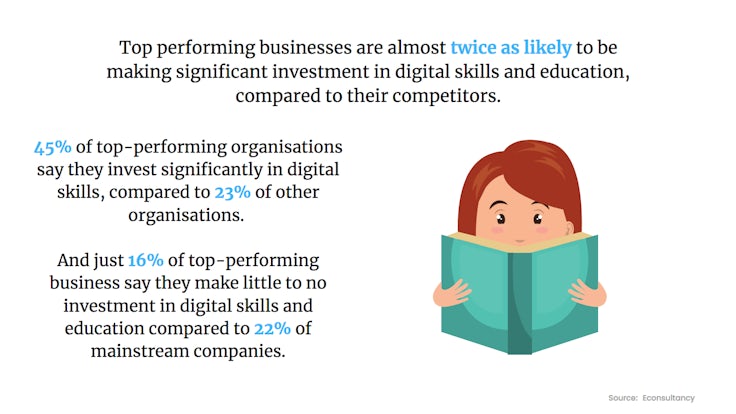Digital skills, ad blocking, TV viewing: 5 killer stats to start your week
We arm marketers with all the numbers they need to tackle the week ahead.
 1. Companies that invest in digital skills outperform rivals
1. Companies that invest in digital skills outperform rivals
Top performing businesses are almost twice as likely to be making significant investment in digital skills and education, compared to their competitors.
Some 45% of top-performing organisations say they invest significantly in digital skills, compared to just 23% of other organisations. Additionally, top performers are 43% more likely to say training is their primary method of adding new skills.
Just 16% of top-performing business says they will be making little to no investment in digital skills and education compared to 22% of mainstream companies that say the same.
Source: Econsultancy
2. Half of UK homes subscribe to online streaming services
 Almost half of all UK homes now subscribe to TV streaming services, with the number of households signed up increasing from 11.2 million (or 39%) in 2018 to 13.3 million (or 47%) in 2019.
Almost half of all UK homes now subscribe to TV streaming services, with the number of households signed up increasing from 11.2 million (or 39%) in 2018 to 13.3 million (or 47%) in 2019.
Average daily viewing of streaming services increased by seven minutes last year to a total of 26 minutes, while YouTube viewing rose by six minutes to 34 minutes. Two in five adults (42%) now consider online video services to be their main way of watching TV and film.
Nevertheless, traditional TV viewing still accounts for the vast majority of TV time, at three hours and 12 minutes on average per day (or 69%).
However, this fell by 11 minutes last year and nine minutes in 2017. Viewers now watch 50 minutes less traditional TV every day than they did in 2010, with the shift most pronounced among people aged 16 to 24, whose viewing of traditional TV has halved.
Source: Ofcom
3. UK economy shrinks for first time in seven years
 The UK economy shrank in the second quarter for the first time in almost seven years.
The UK economy shrank in the second quarter for the first time in almost seven years.
Gross domestic product (GDP) dropped by 0.2% in the three months ending June, having grown by 0.5% in the first quarter of the year. Last year, GDP grew by 1.2% in the second quarter after slowing from 1.8% in Q1.
The services sector registered positive growth in the second quarter but the 0.1% expansion slowed on the 0.4% growth in the first three months of the year.
Meanwhile, the production sector contracted by 1.4% in the second quarter, marking the largest downward contribution to GDP growth. The fall was driven by a sharp decline in manufacturing output, reflective of increased volatility in the first half of the year.
Source: Office for National Statistics
4. FMCG companies ‘wasting’ 60% of online ad spend
 FMCG companies are “wasting” nearly $50bn a year in digital marketing spend because they either can’t measure the return or ROI was negative.
FMCG companies are “wasting” nearly $50bn a year in digital marketing spend because they either can’t measure the return or ROI was negative.
According to a survey of 1,100 marketing execs, of the $79bn spent on online advertising and trade spend (which includes everything from ads on Facebook and YouTube to digital coupons and discounts) in 2018, 60%, or about $47bn, failed to deliver a positive return on investment.
When asked about the barriers to success, 29% of those surveyed cite lack of talent as one of the top three barriers, followed by lack of funding (35%), and an unwillingness to experiment (34%).
Notably, those respondents who consider their organisations as leaders in digital transformation identified culture as a key factor, with 34% rating that as a top-three barrier.
Source: AlixPartners
5. Internet users prefer ad filtering to ad blocking
 More than half (57%) of US internet users say they prefer ad filtering (which involves blocking the most invasive ad formats while allowing less invasive alternatives) to full ad blocking.
More than half (57%) of US internet users say they prefer ad filtering (which involves blocking the most invasive ad formats while allowing less invasive alternatives) to full ad blocking.
Another 71% of respondents recognise the importance of advertising as part of sustaining a ‘free internet’. This indicates that rather than blocking ads completely, users are seeking an ‘ad-light’ experience that removes the most invasive ads while keeping the less intrusive ones.
On top of this, 60% of ad-blocking users are likely to disable their ad-blocking software if they can be promised an ad-light experience, yet only 38% would turn off their ad blocker if asked to by a website.
Source: Eyeo
 1. Companies that invest in digital skills outperform rivals
1. Companies that invest in digital skills outperform rivals





